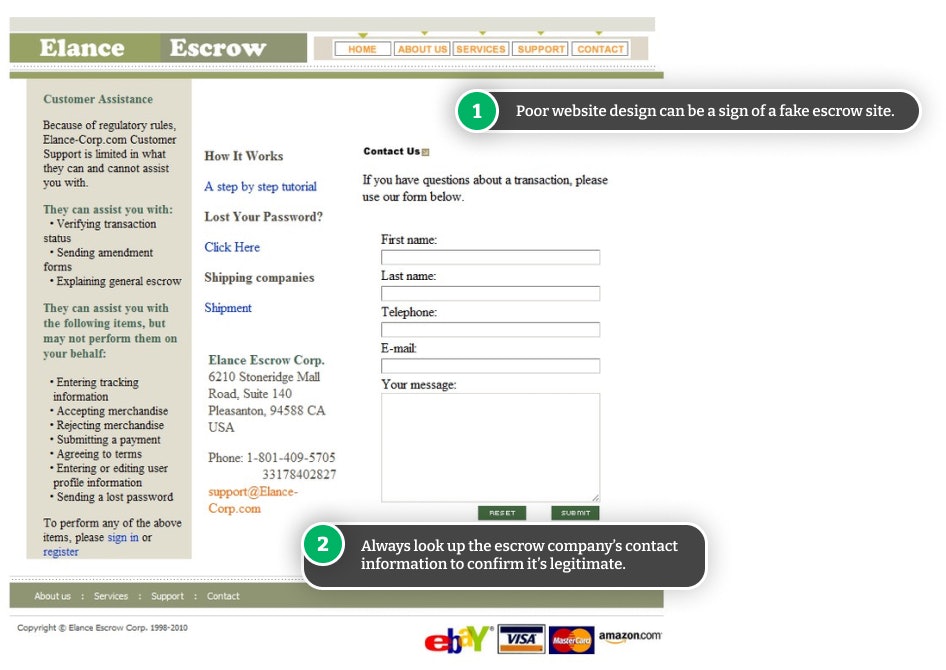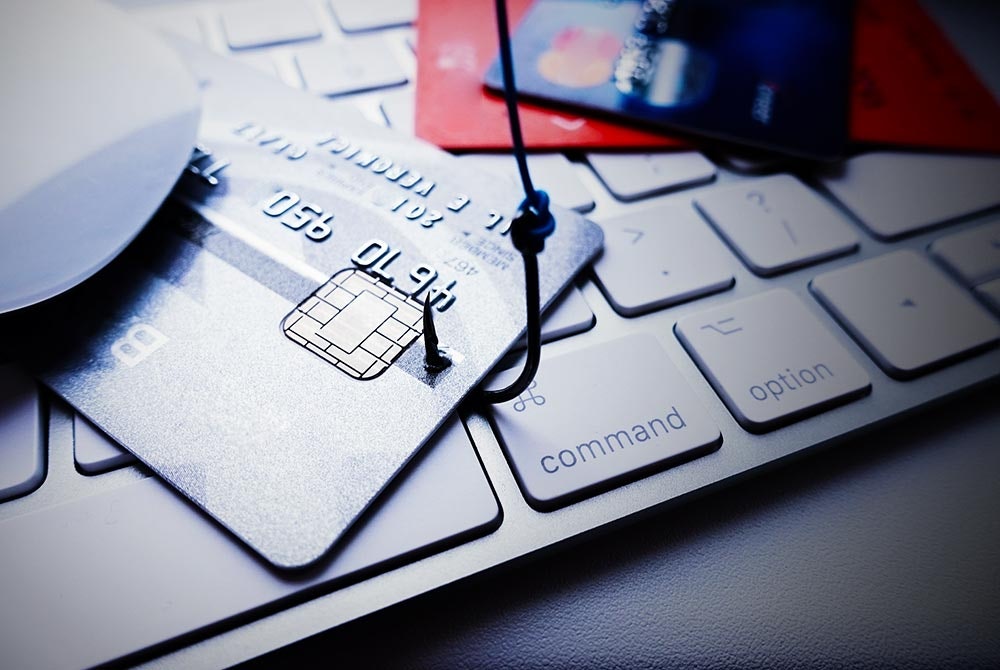- How the Craigslist Fake Escrow Scam Works
- Red Flags of the Fake Escrow Scam on Craigslist
- How to Beat This Craigslist Fake Escrow Scam
- Have You Fallen For This Craigslist Fake Escrow Scam?
- Frequently Asked Questions
In this fake escrow scam, buyers and sellers on Craigslist convince you to use an escrow service to ensure a safe transaction for both parties. However, they direct you to a malicious, fake escrow site that steals your personal and bank account information.
The best way to protect yourself from this fake escrow scam on Craigslist is to only use escrow sites that you know and trust. Spending some time to do a little research can make all the difference and prevent yourself from being scammed.
How the Craigslist Fake Escrow Scam Works
To avoid this Craigslist phishing scam, you'll need to recognize it first. The scam begins when a buyer or seller recommends an escrow site to complete a transaction.
An Escrow Service is Suggested
Regardless of whether you're the buyer or seller on Craigslist, once you both agree on a price for the item, the scammer will say that they want to ensure the transaction is safe and secure and suggest using an escrow service.
The scammer won't want to use Escrow.com or another well-known site—they'll have their own "secure" escrow service. They'll usually send you a link to the site and refuse any attempt to use a service that you recommend. (Note, the scammer will use bad grammar or have spelling mistakes in their communications with you.)
Example Message from ScammerPlease, we will use my recommended escrow service. It is 100% safe and will allow for easy transfer of money between us. Please click on the link below to create your account.
I prefer not to use other escrow service or other payment methods since this will give us the most safe transaction.
You Enter Your Private Information on the Escrow Site
You'll visit the fake site and enter your credit card or bank account information to deposit or receive the funds from the escrow.
The Scammer Steals Your Information and Steals Your Money
Once you've entered your information, the scammer will likely end the conversation and say they're no longer interested or selling. Or they may stop communicating with you altogether. Either way, they've stolen your information and can use this to steal money from your bank account or use your credit card fraudulently.
Red Flags of the Fake Escrow Scam on Craigslist
Scamming on Craigslist isn't new. Scammers have been using the site for stealing and phishing for years now. However, frauds are getting better and harder to detect.
Yes, they usually have a few tell-tale signs, but they're not all filled with grammar errors and Nigerian email addresses. Here are common red flags to pay attention to in order to avoid fake escrow scams on Craigslist:
Grammar
Scammers are good at scamming, but they're not necessarily good at writing—especially not in English. If a buyer or seller request contains several grammatical errors, be on high alert. Yes, legitimate users might not be writing experts, but they should have a basic understanding of grammar rules.
Look for misspellings and incorrect punctuation. Watch for strange line breaks and incomplete sentences. These aren't foolproof, scam-catching techniques, but they are common identifiers.
Plagiarism
Scammers will often create websites and submit buyer requests using the copy/paste method. Use a plagiarism checker to see if they copied a site's terms and conditions or if they've tried the same buying technique on other listings.
Pushy Buyers
If the buyer or seller is insistent on only using the escrow service they are recommending, cancel the transaction with them, as this is a huge red flag. You may have wasted some time and energy on this person already, but that’s not a huge loss compared to what they could steal from you if you continue with the transaction.
Cancel the Transaction If You Don't Feel Safe
If someone refuses to use a legit escrow site like Escrow.com and instead pushes to use a site you can't find any information on, it's safest to cancel the sale as they are likely trying to scam you.
How to Beat This Craigslist Fake Escrow Scam
Confirm the Sender's Identity
The buyer's name and email address should sync up. Do a quick Google search for the name and see what you find. If they don't have a Facebook, Instagram, LinkedIn, or Twitter account, that should be an initial red flag (although not a complete dead giveaway).
- Look for subtle inconsistencies. For example, when you type in an email address on Gmail, it often shows the name on the account, too. Make sure these correlate. Try using a website like Whitepages or TrueCaller to verify details about a name or phone number. If you find discrepancies, be cautious moving forward.
- Ask the buyer or seller to verify details about themselves. If their email address signature says they live in Idaho, but they're requesting an item be shipped to California, ask questions to figure out what's going on. If a scammer thinks you're on to them, they'll usually run rather than try to convince you otherwise.
You can also do a little digging and check out online forums. Many people post their experiences with Craigslist scammers online on sites like Reddit and Twitter. If the scammer has gotten lazy and used the same name more than once, you’ll be able to verify the scam quite easily.
Not All Escrow Sites Are Trustworthy
Only use legitimate escrow sites like Escrow.com or ask to complete the transaction using cash or other protected/safer method (e.g., PayPal).
Double-Check the Escrow Site's Authenticity
Scammers can create look-alike websites that copy the wording and format of legitimate escrow sites. Do your due diligence to confirm any site's authenticity.
- Always check the URL first.
- Be wary of sites with URLs like simpleescrow.net or whyescrow.com.
- Ensure the site has Secure Sockets Layer (SSL).
- You can check this on Google Chrome's browser by hovering over the lock symbol to the left of the URL address—it'll let you know if the site's connection is secure.
- Non-legitimate websites can be "secure," too, so this isn't a one-and-only tell-tale sign.
- Verify the contact information listed on the site.
- Attempt to call the number listed.
- If the number doesn't pick up, then don't trust the site.
- If a recipient does answer, then ask them questions to verify their site information. Ask them for the URL of their website and make sure the two correlate.
Safety Checklist
- Deal locally and in-person: Craigslist recommends users "deal locally, face-to-face." This will prevent several online phishing scams.
- Do not click any links: If a buyer or seller sends you a link, do not click on it. Instead, type in the location in Google and look for it in the search results. This will give you more information about the site before you visit it.
- Use Escrow.com: Escrow services aren't all bad—there are some legitimate ones out there that can genuinely protect your transactions. Escrow.com is a safe, secure escrow service. If a buyer or seller insists on using an escrow, then you be the one who chooses the service—not them.
- Look out for copycat websites: Scammers create look-alike websites that mimic real escrow domains. Do your due diligence to check the URL, certifications, and contact information of a website before trusting it's legitimate.
- Never give out financial information: Don't share your bank accounts, logins, or other sensitive data that could put you at risk.
Have You Fallen For This Craigslist Fake Escrow Scam?
Mistakes happen, so don't beat yourself up. If you've fallen for this scam, follow these steps as soon as you can:
- Protect your accounts
- Report the scam
- Change your passwords
Protect Your Bank/Credit Card Accounts
Contact your credit card companies and banks to let them know about the scam. They can freeze your accounts and disable your cards to protect your financial assets.
If money has already been stolen from your accounts or credit cards, most banks will credit most (if not all) of the money back to your account. Dispute the transaction.
Report the Craigslist Fake Escrow Scam
Once you're protected from future loss, contact the proper authorities:
- Craigslist: Contact the appropriate party via Craigslist's online form, and let them know what happened.
- FBI Internet Crime Complaint Center (IC3): Report internet crimes to the FBI's digital division.
- Better Business Bureau (BBB): Report your situation with the local BBB and BBB Scam Tracker.
- Federal Trade Commission (FTC): Report your situation online at ftc.gov or over the phone at 877-FTC-Help.
These authorities can better help you protect your accounts and assets. They'll also need your help to catch the scammer and prevent other Craigslist scams and phishing scams.
Change Your Passwords
The scammer may have stolen additional sensitive information from your accounts, especially if you use the same password across multiple websites. Don't wait for your accounts to get hacked to take action.


Comments